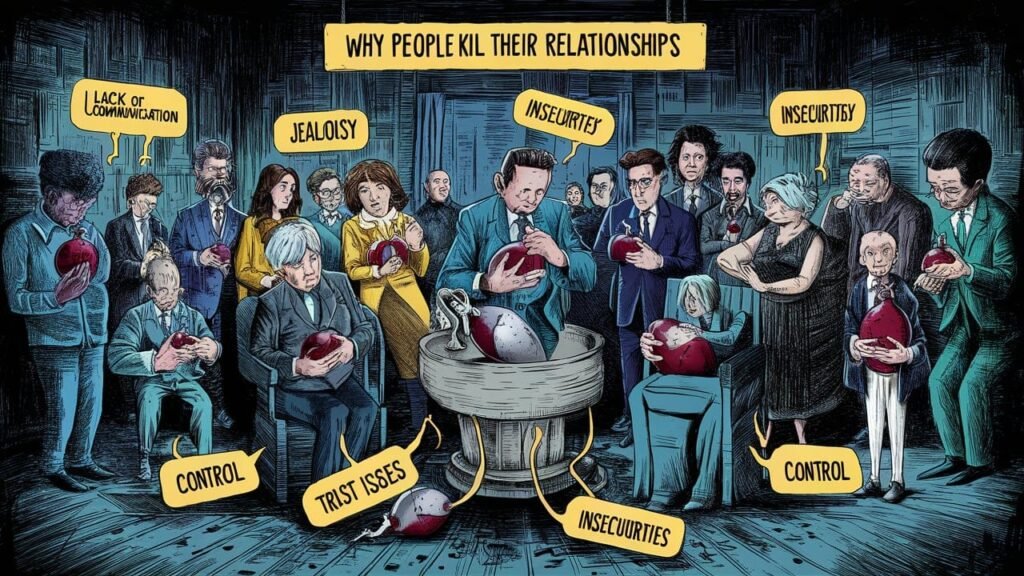Share This Article
Do you wonder why it always happens to you that a relationship ends after just a few months? Do you find it difficult to ‘stick’ after a few months of dating? And do you have a habit of withdrawing when things get serious? If you answer yes to these questions, you may be a self-sabotaging person.
What is self-sabotage?
Some people want a happy relationship , but always manage to screw it up. Consciously or unconsciously, they do things that damage the relationship. This is called self-sabotage. Through their thoughts and behavior they thwart their own happiness and well-being. In relationships, self-sabotage is the behavior you exhibit when you deliberately try to ruin or hinder your own relationship.
For some people, this behavior has become so normal that it is difficult to recognize. They may not even know they are doing it, while they still have the feeling that they are doing ‘something’ wrong. That’s when you feel like the only thing standing between you and a healthy relationship is you.
New research from James Cook University in Australia, published in the Journal of Couple & Relationship Therapy , provides some reasons why people self-sabotage their relationships. The study defines self-sabotage as the use of self-destructive actions in relationships that are intended to “hinder success or reduce effort to justify failure.” In other words: the things people do to ruin their relationships.
The study asked 696 international participants with relationship experience to answer a number of questions. The average age of participants was 31 years, 75% were female, 80% heterosexual and 62% were in a romantic relationship. They were asked why they sabotage their relationships and what they do to avoid getting hurt.
ALSO READ: Want to Make Up for An Argument with Your Boyfriend or Girlfriend? Follow These 9 Steps

5 reasons for self-sabotage
There are several reasons why people practice self-sabotage. After analyzing the answers, the researchers were able to divide these reasons into five themes.
- Fear: such as fear of being hurt ( heartbroken ), rejected or abandoned.
- Poor or negative self-image: such as a feeling of inferiority.
- Trust issues: such as those caused by past betrayals.
- High expectations: such as perfectionistic tendencies and predestined beliefs (fairytale fantasies).
- Inadequate relationship skills: such as immaturity and inexperience.
ALSO READ: Unhealthy Behavior in Relationships: 4 Examples of The Worst Patterns
6 techniques to avoid getting hurt
In order not to get hurt, people engage in various destructive actions. Some ignore their partner, others say there is nothing wrong when it is. For the purpose of protecting themselves, people do these things to avoid being hurt.
- Withdrawal from relationship: such as physically or emotionally distancing yourself from the partner, not sharing emotions or becoming emotionally unavailable and no longer making an effort for the relationship.
- Defensive behavior: such as feeling (rightly) indignant and victimized.
- Pretending: Such as lying to themselves or a partner about their thoughts, feelings, or the state of the relationship (e.g., “I’m doing just fine.”).
- Commitment to the relationship: such as holding on strongly to the relationship, desperate for an emotional connection and demanding a response, trying to please the partner, and negotiating to maintain the relationship.
- Attacking the partner: such as constantly criticizing or blaming the partner – to protect themselves or maintain power in the relationship.
- Attraction and repulsion: such as withdrawing when the partner is needy, but holding on when the partner is avoidant.
ALSO READ: 15 Signs That You Are No Longer Interested in Your Partner (or Relationship)
How to reduce self-sabotage in relationships
Why people destroy their relationships differs per situation. While fear is the main reason for sabotaging a relationship , it is also often a result of poor self-image and trust issues. How can you stop or reduce self-destructive behavior? Psychologist Arash Emamzadeh says there are several ways to reduce self-sabotage.
The first option is to improve your skills in building and maintaining relationships. That is, learning to have positive interactions, regularly expressing commitment to your partner, having open discussions, and dividing the tasks.
What also helps, Emamzadeh explains , is detecting recurring patterns that occur in conflicts. Recognizing these patterns is important because many relationship conflicts have to do with personality differences or preferences that will not change.
Finally, couples must learn mutual acceptance. A healthy love relationship requires vulnerability and a willingness to rely on each other, even when it is disappointing at times. Maintaining happy and healthy relationships takes work.
“Small steps at a time,” says Emamzadeh. “These small but positive steps may not seem like much, but over time they make a big difference in the patterns of interactions and communication. And they prevent couples from unintentionally sabotaging a valued love relationship.”
P.S. Are you already following Gistinger.com on Facebook , Instagram and Twitter?

